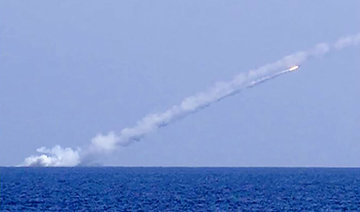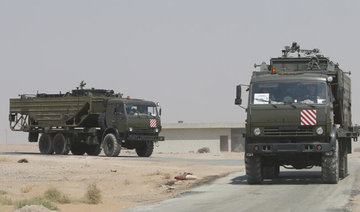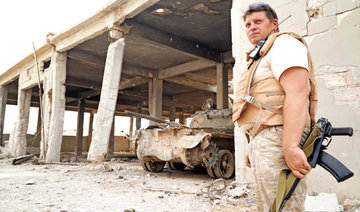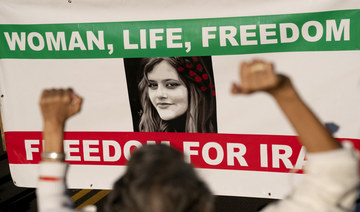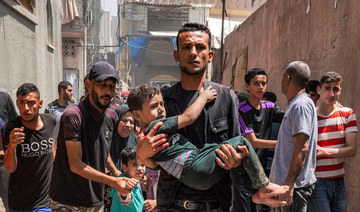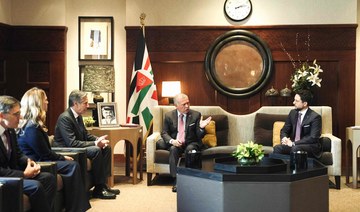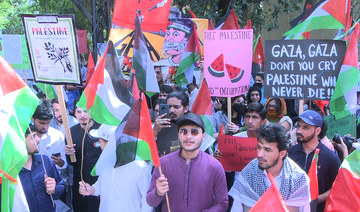NEW YORK: Russia on Thursday clashed with the EU over Syria, accusing the bloc of politicizing aid by linking reconstruction funds to a political transition that would end the war.
The EU in April secured pledges of $6 billion in aid for Syria, now in its seventh year of war, with over 330,000 people dead.
At an EU-organized conference held on the sidelines of the UN General Assembly in New York, Russia’s deputy foreign minister said aid was being used as a political tool to build pressure on Syrian leader Bashar Assad.
“The politicization of issues related to aid and the statements on the need to wait for the end of the political process are unacceptable,” said Gennady Gatilov.
European officials insist that aid will not flow to Syria until a credible political transition is agreed during UN-led negotiations to end the war.
But Gatilov said aid was needed now “to rebuild schools, hospitals and critical infrastructure.”
Britain argued that the Assad regime should not be rewarded with aid, while France accused Damascus of continuing to block humanitarian deliveries.
EU foreign policy chief Federica Mogherini announced that a second conference on reconstruction aid for Syria will be held in the spring of 2018.
“We are ready to help even more, to see how we can help to bring back normal life in areas where violence has de-escalated, and to start working on reconstruction, only once a political agreement has been reached in Geneva,” said Mogherini.
Meanwhile, a Russian submarine in the Mediterranean fired cruise missiles at Al-Qaeda-linked militant positions in northwestern Syria on Friday, a day after militants wounded three Russian troops in the area, the Defense Ministry said in Moscow.
The ministry said the missile strikes from the Veliky Novgorod submarine earlier in the day targeted militants, ammunition depots and fortifications in Syria’s northwestern Idlib province, which is dominated by Al-Qaeda-linked Levant Liberation Committee.
On Thursday, three Russian troops were wounded after militants encircled 29 Russian military officers deployed outside of Idlib for several hours. The Russian troops repelled the attack with the help of local tribes, the Russian ministry said.
Over the past weeks, Russia has fired cruise missiles from the Mediterranean toward positions of Daesh in the eastern province of Deir Ezzor but attacks on Idlib have been rare.
Moscow said the Kalibr missiles destroyed command centers and a training base of the militants who had attacked members of the Russian military police in Hama province earlier this week.
Russia targeted militants, armored vehicles, ammunition depots and fortifications of Al-Qaeda’s Syria branch in Idlib.
The Russian Defense Ministry said the missiles were fired at 10:11 a.m. local time from the Mediterranean at targets 300 km away.
“Surprise missiles strikes in Idlib province destroyed important command posts, training bases and armored vehicles of the terrorists who took part in an attempt to capture 29 Russian military policemen in southern Hama province,” the ministry statement said, citing intelligence reports.
Moscow clashes with EU over aid to Syria
Moscow clashes with EU over aid to Syria
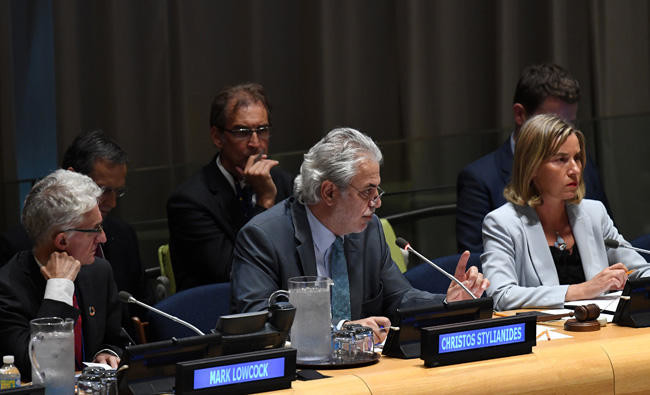
Iran files charges over BBC report on teen girl allegedly killed by security forces in 2022 protests
Iran files charges over BBC report on teen girl allegedly killed by security forces in 2022 protests
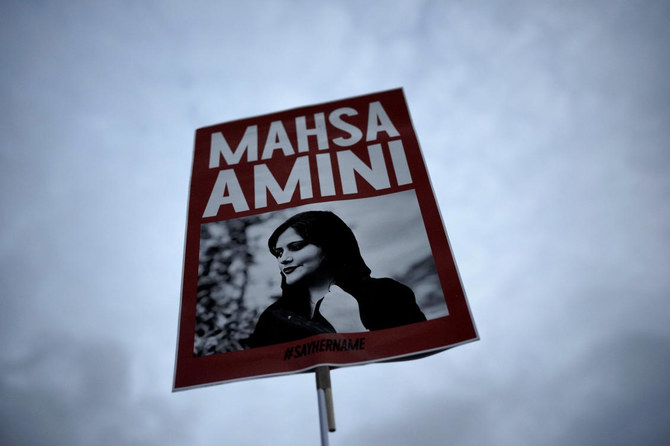
- Nika Shakarami’s death also sparked widespread outrage at the time
- Amini died after being detained by police over allegedly not wearing her mandatory hijab, or headscarf, to their liking
JERUSALEM: Iranian prosecutors filed criminal charges on Wednesday targeting activists and journalists following a BBC report that alleged security forces had “sexually assaulted and killed” a 16-year-old girl during protests over the death of Mahsa Amini in 2022.
Nika Shakarami’s death also sparked widespread outrage at the time.
Amini died after being detained by police over allegedly not wearing her mandatory hijab, or headscarf, to their liking. UN investigators have said Iran is responsible for the “physical violence” that led to Amini’s death.
In Shakarami’s case, authorities said she died after falling from a tall building, something immediately disputed by her mother, who said her daughter had been beaten.
The BBC report published on Monday — relying on what it described as a report written for Iran’s paramilitary Revolutionary Guard — said Shakarami was detained by undercover security forces who molested her, then killed her with batons and electronic stun guns after she struggled against the assault.
Iran’s Mizan news agency, run by the country’s judiciary, said on Wednesday that the BBC story was “a fake, incorrect and full-of-mistakes report,” without addressing any of the alleged errors it contained.
It was the government’s first acknowledgment of the BBC report and it said “journalists and activists” have been summoned over the issue.
“The Tehran Prosecutor’s Office filed a criminal case against these people,” Mizan said, with charges including “spreading lies” and “propaganda against the system.” The first charge can carry up at a year and a half in prison and dozens of lashes, while the second can involve up to a year’s imprisonment.
Mizan did not identify those charges and it was unclear whether prosecutors had charged three BBC journalists who bylined the report. Those associated with the BBC’s Persian service have been targeted for years by Tehran and barred from working in the country since its disputed 2009 presidential election and Green Movement protests.
The BBC did not immediately respond to a request for comment. The broadcaster noted that in recent years, there have been faked documents floating around during widespread protests, purporting to be from the Iranian government.
However, it said it had “confidence that it is genuine,” despite an inconsistency in the report using an old acronym for the police.
Iranian Interior Minister Ahmad Vahidi on Wednesday tried to dismiss the BBC report as an effort to “divert attention” from ongoing protests at American universities over the Israel-Hamas war — despite the events dominating US television networks.
“The enemy and their media have resorted to false and far-fetched reports to conduct psychological operations,” Vahidi said, according to the state-run IRNA news agency.
UAE braced for severe weather, task force on high alert
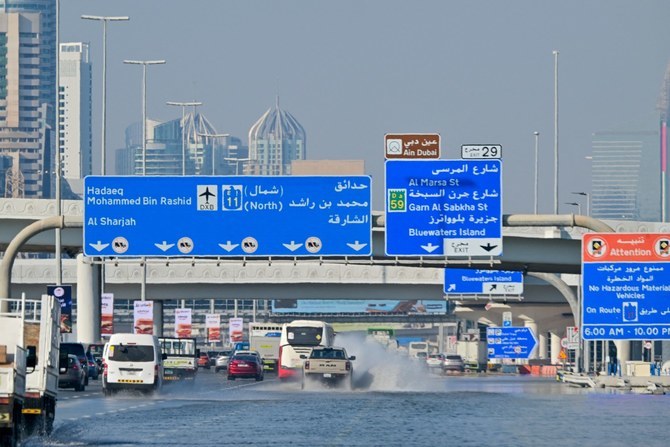
- UAE’s disaster management authority warns residents to expect rain, storms over next two days
- All private schools in UAE to switch to remote learning as precaution on Thursday and Friday
DUBAI: Challenging weather is again expected in the UAE, with parts of the country’s east coast set to experience strong winds.
The National Emergency Crisis and Disaster Management Authority said gusts of up to 40 kph were likely to impact the area on Thursday.
While the NCM forecasts less severe conditions than those in April, it has warned residents to expect rain and storms over the next two days. There is a possibility of hail in the eastern regions, possibly extending to some internal and western areas.
Clouds are expected to decrease on Friday and Saturday, with possible light to medium rain which may be heavier in some southern and eastern regions.
Government agencies are coordinating with the Joint Weather and Tropical Assessment Team to monitor developments, said a statement from the NCM.
The teams will assess the potential impact of weather conditions and implement proactive measures where necessary.
Dubai’s government announced all private schools in the UAE would switch to remote learning on Thursday and Friday as a precaution.
Authorities have urged the public to exercise caution, adhere to safety standards and guidelines, refrain from circulating rumors, and rely on official sources for information.
The UAE is still recovering from last month’s storms which caused widespread flooding, submerging streets and disrupting flights at Dubai International Airport.
Hamas official insists Gaza ceasefire must be permanent

- Suhail Al-Hindi, a senior Hamas official said the group would “deliver its response clearly within a very short period“
- He stressed the aim was “to reach an end to this war“
GAZA, Palestinian Territories: Hamas will respond to an Israeli truce proposal for Gaza “within a very short period,” an official with the Palestinian militant group said Wednesday, stressing though that any ceasefire needs to be permanent.
Hamas is considering a plan for a 40-day ceasefire and the exchange of scores of hostages for larger numbers of Palestinian prisoners.
Suhail Al-Hindi, a senior Hamas official, told AFP the group would “deliver its response clearly within a very short period,” although he would not say precisely when that was expected to happen.
Speaking to AFP by phone from an undisclosed location, he said it was premature to say whether the Hamas envoys, who have returned from talks in Cairo to their base in Qatar, felt any progress was made.
He stressed the aim was “to reach an end to this war.”
But that would seem to be at odds with Israel’s determination to push ahead with its vast ground offensive in southern Gaza.
A source with knowledge of the negotiations said Qatari mediators expected a response from Hamas in one or two days.
The source said Israel’s proposal contained “real concessions” including a period of “sustainable calm” following an initial pause in fighting and the exchange of hostages of and prisoners.
The source said Israel’s withdrawal from the Gaza Strip remained a likely point of contention.
An Israeli official told AFP the government “will wait for answers until Wednesday night,” and then “make a decision” whether to send envoys to Cairo to nail down a deal.
Jordan says Israeli settlers attacked Jordanian aid convoys on way to Gaza
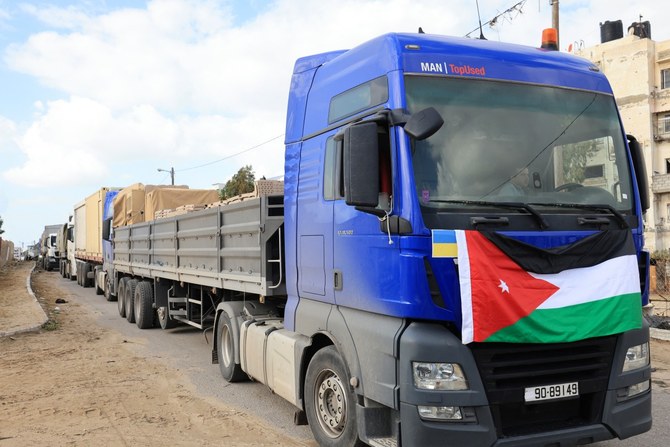
- “Two Jordanian aid convoys carrying food, flour and other humanitarian aid to the Gaza Strip were attacked by settlers,” the ministry said
- Both convoys continued on their way and managed to reach their destination in Israeli-besieged Gaza
DUBAI: Jordan’s foreign ministry said some Israeli settlers attacked two of its humanitarian aid convoys as they made their way toward the Gaza Strip on Wednesday.
Both convoys continued on their way and managed to reach their destination in Israeli-besieged Gaza, the ministry said in a statement.
“Two Jordanian aid convoys carrying food, flour and other humanitarian aid to the Gaza Strip were attacked by settlers,” the ministry said, without giving details of the incident.
Honenu, an Israeli legal aid agency, said in a statement that four men who “blocked aid trucks (going) to Gaza” near the large West Bank settlement of Ma’ale Adumim had been arrested by Israeli police.
One of the convoys was bound for the Kerem Shalom crossing into Gaza and the other for the Erez crossing, the Jordanian foreign ministry said.
US surgeon in Gaza: nothing prepared me for scale of injuries

- Around 70 percent of the surgeries he performed were on injuries caused by shrapnel
- Team would deal with 40-60 patients a day
CAIRO: A US vascular surgeon who left Gaza after a stint as a volunteer said on Wednesday nothing had prepared him for the scale of injuries he had faced there.
Dozens of patients a day. Most of them young. Most facing complicated injuries caused by shrapnel. Most ending up with amputations.
“Vascular surgery is really a disease for older patients and I would say I had never operated on anybody less than 16, and that was the majority of patients that we did this time around,” Shariq Sayeed, from Atlanta, Georgia, told Reuters in Cairo.
“Most were patients 13, 14, 15, 16 and 17 years of age. Mostly shrapnel wounds, and that was something I have never dealt with, that was something new.”
In his stint at the European Hospital in Gaza, Sayeed said his team would deal with 40-60 patients a day. The vast majority were amputation cases.
“And unfortunately there is a very high incidence of infection as well so once you have an amputation that doesn’t heal, you end of getting a higher amputation,” he said.
Around 70 percent of the surgeries he performed were on injuries caused by shrapnel, the rest mostly from blast injuries and collapsing buildings.
Ismail Mehr, an anaesthesiologist from New York State, who led the Gaza mission, said the volunteer medics were “speechless at what we saw” when they arrived this month in southern Gaza.
Mehr is chairman of IMANA Medical Relief, a program that focuses on disaster medical relief and health care support and has provided treatment to over 2.5 million patients in 34 countries and counting.
He has been to Gaza several times in the past, but could not imagine what he saw this time: “Truly everywhere I saw was destruction in Khan Younis, not a single building standing.”
Out of 36 hospitals that used to serve more than 2 million residents, just 10 were somewhat functional by early April, according to the World Health Organization.
Health facilities lacked medical supplies, equipment, staff, and power supplies, Mehr said. His biggest fear now is an expected Israeli assault into the southern city of Rafah, where half of Gaza’s 2.3 million people have sought shelter.
“I hope and I pray that Rafah is not attacked,” he said. “The health system will not be able to take care of that. It will be a complete catastrophe.”


